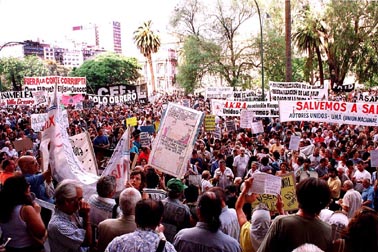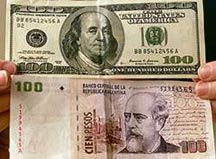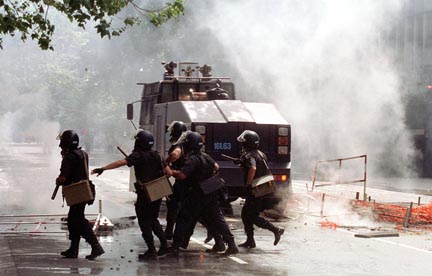
January 2002
From
Protest to the Struggle for Proletarian Power
Mass
Upheaval Rocks Argentina
Brazilian
Workers Movement Under Attack

One of the recent “cacerolazos” (pots-and-pans
protests) in Buenos
Aires, January 24, against the Supreme
Court. The crowd chanted:
“They must all go!” (Photo:
Roberto Azcarate/Betha)
Not
Populist Appeals Against “Neo-Liberalism”
But Workers Revolution to Bring Down Capitalism!
This article is translated from Vanguarda Operária No. 6, January-February 2002, published by the Liga Quarta-Internacionalista do Brasil, section of the League for the Fourth International.
December 19 was a day of reckoning in Argentina. After four years of wrenching economic crisis, hundreds of highway blockades by thousands of unemployed workers, eight general strikes against the Radical “Alliance” government, while starving people from the shantytowns emptied supermarkets of food all over the country, the fury of a devastated middle class boiled over. Late in a day marked by demonstrations and looting, during which the police shot and killed 25 people and wounded another 400, Fernando De la Rúa decreed a state of siege. But the people of Buenos Aires did not back down. They went into the streets of the Argentine capital at midnight, banging pots and pans and demanding the resignation of the Radical Party president. By the next afternoon he was gone, leaving the terrace of the Casa Rosada by helicopter to avoid being lynched by the furious crowds besieging Argentina’s seat of government.
From that day on, the Buenos Aires population has repeatedly returned to the streets with its “cacerolazos” (pots-and-pans demonstrations) demanding the removal of presidents, ministers and the entire Supreme Court, all considered corrupt and “traitors.” The country had five presidents in less than two weeks. After Eduardo Duhalde took office, following closed-door negotiations by the leaders of the Justicialist Party (PJ – the populist party founded by General Juan Domingo Perón), there was a relative truce for several weeks. But when Duhalde announced that dollar-denominated bank accounts, which had been blocked since the beginning of December, would only be paid out in drastically devalued pesos, and then not until 2005, the popular response was not long in coming. On January 25, the first national “mega-cacerolazo” took place, demanding: “They must all go!” Police dispersed the march with tear gas, arresting scores of demonstrators, and the government cynically congratulated itself on how “peacefully” the protest came off.
Meanwhile, in Brazil attacks have been mounting against the workers movement. At the end of the year the House of Representatives voted a bill which, if approved by the Senate, will abolish union gains concerning overtime, holidays, maternity leave, the “13th month” (annual end-of-year bonus), and other union gains which go back more than 60 years (what President Fernando Henrique Cardoso calls “the end of the Vargas era”). At the same time, the minimum wage will remain at R$180 (US$75) a month. The weekly magazine Veja fulminated against the “straitjacket of Brazilian labor laws,” which hinder the bosses from laying off workers with impunity.
Simultaneously there has been a wave of murder assaults on labor and peasants leaders. In September, the mayor of Campinas, the second largest city of the state of São Paulo, a member of the Workers Party (PT), was assassinated. In mid-January, the PT mayor of Santo André (also in São Paulo state) was shot to death after being kidnapped. Workers Party president José Dirceu and other deputies and PT leaders have received death threats. Also in January, José Rainha, one of the top leaders of the Landless Peasants Movement (MST) was gravely wounded by two shots in the back. The bourgeois press talks of actions by “gangs,” when everything indicates that what is involved is a resurgence of death squads.
From Buenos Aires to São Paulo, the social temperature has reached the boiling point. Opportunists of all stripes, reformists and centrists, declare that this is the result of “globalization” and “neo-liberalism.” From Duhalde’s PJ in Argentina to Brazilian PT led by Luis Inácio Lula da Silva, they call for changing the economic “model,” to give priority to “national interests.” Yet the current crisis is not the result of some economic policy, the product of the “Chicago Boys” or the International Monetary Fund, but rather reflects the fundamental contradictions of capitalism. The protectionist and populist policies pushed by bourgeois politicians Itamar Franco and Leonel Brizola or by the reformist Lula have been exhausted. There are no economic resources for a new period of Keynesianism, stimulating industrial production with deficit financing. In reality, these champions of antiglobalization are playing the game of Wall Street and certain sectors of the local bourgeoisie, and it is the workers who will reap the bitter fruits to come.
 From
“dollarization”to “pesoization” and back. (Photo: Reuters)
From
“dollarization”to “pesoization” and back. (Photo: Reuters)
The social explosion which has convulsed Argentina has sent out shock waves throughout the world. This is not a particular case, but a striking example of the free market economic policies under imperialist domination over the last two decades. Under the Radical Party government of Raúl Alfonsín, the Peronist Carlos Saúl Menem and the Radical Alliance president De la Rúa, Argentina has been the favorite pupil of the IMF. A decade ago, Menem effectively dollarized the economy of the republic on the Río de la Plata, fixing the Argentine peso at parity with the U.S. greenback. Suddenly hyperinflation plummeted…and the unemployment rate shot up. While federal and state governments ordered mass layoffs of workers, international investors flocked to the country, buying up nationalized industries (the airlines, telephone company, the YPF national oil company) and taking over the whole of the banking sector. In Wall Street there was euphoria over the stratospheric profits; in the proletarian town of La Matanza in the sprawling urban areas surrounding Buenos Aires there was outrage over the spreading misery.
With the fall of the Soviet Union and the bureaucratically deformed workers states of East Europe, Yankee imperialism and its European partners bragged of their triumph over the feared communist threat. But today world capitalism confronts an escalating economic crisis in the middle of a war. Now it must pay the piper for a decade of runaway speculation and a mythical “new economy.”
The shock waves of the economic earthquake that had its epicenter in the Río de la Plata have spread to Rio de Janeiro, São Paulo and the rest of the Southern Cone of South America. The São Paulo capitalists boast of their “good luck” for having devalued the real (the Brazilian currency) earlier, making their companies more “competitive.” In Argentina, populist politicians and sectors of the union bureaucracy are trying to divert the working-class anger with reactionary nationalist rhetoric and protectionist calls. As De la Rúa resigned, Argentine shoe workers demonstrated with signs accusing “Brazil” of “stealing Argentine jobs.” They were echoing the U.S. steel companies and union bureaucrats who accuse Brazil of “dumping” steel (selling below the cost of production) due to the low cost of labor (i.e., the poverty wages paid in this country). Against this poison, it is necessary to struggle with the arms of proletarian internationalism, working-class solidarity based on a common struggle against capitalism and the ravages it produces among the exploited and oppressed.
The Argentine crisis has opened a potentially revolutionary situation. In Lenin’s famous phrase, the rulers cannot go on ruling as in the past, and the ruled can no longer tolerate being ruled as before. But the big factor missing in this equation is a revolutionary leadership capable of organizing and leading the struggles of the exploited and oppressed to the taking of power by the proletariat. The most urgent task is to cohere the nucleus of a revolutionary workers party like that built by the Bolsheviks under Lenin and Trotsky. Such a vanguard party can only be built in the struggle to reforge a genuinely Trotskyist Fourth International. It must present a program of transitional demands to lead struggles towards international socialist revolution, the only real way out of the present excruciating situation.
It is clear to everyone that the debacle in Buenos Aires is rooted in an unpayable foreign debt. The “solution” put forward by Duhalde & Co. is to “pesoize” the dollarized economy while devaluating the Argentine peso, which has already fallen to 1.65 to the dollar. The Peronist leader presented his program with nationalist airs, complaining that neo-liberalism had turned Argentina into a “dominated country,” as General Perón had predicted decades ago. But he is using this smokescreen to hide the fact that his devaluation policies are also the program of the IMF. For many years, the imperialist agency charged with imposing financial “discipline” insisted on maintaining dollar parity and on paying the debt, by carrying out drastic cuts in government spending. But given the scope of the economic crisis, the IMF changed its tune and criticized De la Rúa for not devaluating earlier.
The Radical leader didn’t, because he knew that this would result in bankruptcy for the banks and many Argentine companies, forced to pay dollar-denominated debts with more and more pesos. That is exactly what Washington wants, in order to permit U.S. companies to buy up at bargain prices the economic infrastructure of the country. In Argentina, it wasn’t American companies who bought up the privatized industries but European firms, with Spain in the lead. Now with devaluation, many of them will be forced to close their doors or leave the country. The sharks of Wall Street will gobble up what’s left.
 State
of siege in Buenos Aires. Riot police called out on December 20 couldn’t
stop mass protests. Opportunist left hails “revolutionary days” when key
is to forge revolutionary vanguard party to lead struggle to workers revolution.
(Photo: Betha)
State
of siege in Buenos Aires. Riot police called out on December 20 couldn’t
stop mass protests. Opportunist left hails “revolutionary days” when key
is to forge revolutionary vanguard party to lead struggle to workers revolution.
(Photo: Betha)
Thus in order to save the working people of Argentina from ruin, it is necessary not only to repudiate the foreign debt but also to expropriate the banks and the rest of the key companies in the country, something no capitalist government is about to do, whatever nationalist rhetoric it may employ. Even a revolutionary workers government would have enormous difficulty in the face of the inevitable reprisals by imperialism in carrying out these essential steps which require international socialist revolution. Yet the bulk of the Argentine left is bound up in virulent nationalism, as it has been for more than half a century. In many of the protests the only symbol is the blue-and-white national flag, and the most common chant is “Argentina, Argentina!” But in order to win, a revolutionary struggle in Argentina must extend to the rest of the Mercosul (the Common Market of the Southern Cone). And it would have to spark struggle by North American, European and Japanese workers to defeat the imperialist octopus in its home countries.
It is also under the sign of nationalism that the centrist and reformist left capitulates to Peronism, as it has throughout the last decades (notably in the 1982 war over the Malvinas/Falklands islands when they supported the military adventure of the military dictatorship). Thus groups like the Partido Obrero (PO – Workers Party) of Jorge Altamira and the Partido de Trabajadores por el Socialismo (PTS – Socialist Workers Party) agree in calling the popular protests of 19 and 20 December “Revolutionary Days.” What revolution?
Behind their praise of the initiative of “the masses,” the fact is that these days resulted in a Justicialist (Peronist) government – that is, the same thieves who imposed dollarization of the Argentine economy are now imposing its “pesoization,” while feathering their own nests. But this doesn’t stop these pseudo-Trotskyist impostors from comparing the “argentinazo” with the 1969 “cordobazo,” despite the fact that the latter was led by the auto workers of the industrial city of Córdoba and the “cacerolazos” are dominated by sectors of the middle class. Even in this case, when their protests are directed against the reactionary governments of the day, we must not forget that the first “pots-and-pans demonstration” was directed against the Unidad Popular of Salvador Allende in Chile in 1973.
All the main left groups in Argentina put forward one or another variant of a “democratic” policy, which seeks to solve Argentina’s crisis within the framework of capitalism. On December 22, at the height of the “revolutionary days,” PO signed a joint declaration together with the United Left (IU), dominated by Stalinist forces, calling for canceling the state of siege, non-payment of the debt, nationalization of the banks, restatification of privatized companies, etc., all carried out by a “workers and people’s government.” The label “people’s” makes it clear that they are not talking of a revolutionary workers government, but rather a slightly more left version of a class-collaborationist popular front.
The “big fish” in the pseudo-Trotskyist swamp in Argentina are all agreed in calling for a “constituent assembly.” Do they claim that there are still holdovers from feudalism in Argentina, a country without a peasantry (the rural settlements are almost all of agricultural wage workers)? Nor is Argentina under the boot of a military dictatorship, having instead had a series of elected parliamentary governments. No, this slogan is expressing the desire of these opportunist groups to sidle up to the middle class on a “democratic” (i.e., bourgeois) and not a socialist basis. It is the current expression of the so-called “democratic revolution” preached by the late Nahuel Moreno – the godfather of the PTS, MAS and MTS – who raised this slogan echoing the anti-Soviet propaganda of the Reaganites in the 1980s.
The false pretenders to Trotskyism also agree in hailing the organizations of the piqueteros (picketers) and now the neighborhood assemblies as some kind of soviets. Yet the soviets were workers councils which served as the framework for the workers insurrection and later for constructing the dictatorship of the proletariat. The picketers’ assemblies, as important as they have been in organizing protests such as the highway blockades, consist mainly of unemployed workers. The “popular assemblies” in the neighborhoods bring together above all elements of the ruined petty bourgeoisie, who are being asphyxiated for lack of access to their blocked bank accounts. Who has not been present at the mass protests are the industrial workers, the principal force that must be mobilized in order to carry out a socialist revolution.
Obviously, this is due to the stranglehold of the Peronist bureaucrats on the union movement. While divided into several federation (CGT, CGT Rebelde, CTA), all the main leaders are part of the “Justicialist” movement founded by General Perón. But the opportunist left is an accomplice in this domination of the labor movement by a bourgeois party. None of the main Trotskyoid groups carries out real opposition work in the unions. As PO does with its “Workers Pole,” they prefer to make alliances with dissident bureaucrats, forming “combative” coordinating committees with the heads of the CTA rather than forging a communist opposition that fights to defeat the entire pro-capitalist bureaucracy of the workers movement.
In Brazil as well, the reformists seek to respond to the attacks on the workers movement while respecting the bourgeois framework. The leadership of the CUT union federation claims to be fighting the labor law “reform” by organizing strikes…to pressure the Senate! Instead, the Trotskyists call for extending the struggles from Argentina to Brazil and the rest of Latin America up to Wall Street.
Solidarity with the Argentine workers! Forge a revolutionary internationalist
leadership!
Unite the struggles of Argentine and Brazilian workers! For permanent
revolution!
Against the UCR (Radicals) and PJ (Peronists) in Argentina, Against
Cardoso and the Popular Front in Brazil – Workers to power!
In Argentina: form workers councils, fight for a workers government!
Smash the imperialist debt – For socialist revolution from the Southern
Cone to the U.S.!
For a federation of workers republics of the Southern Cone! For
the Socialist United States of Latin America!
Forge Trotskyist parties in Brazil and Argentina! Reforge the Fourth
International!
To contact the Internationalist Group and the League for the Fourth International, send e-mail to: internationalistgroup@msn.com